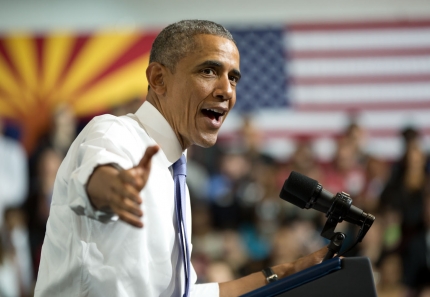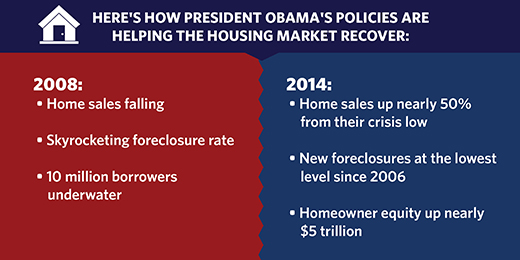The White House
Office of the Press Secretary
President Obama Announces More Key Administration Posts
WASHINGTON, DC – Today, President Barack Obama announced his intent to nominate the following individuals to key Administration posts:
- Patricia Cahill – Member, Board of Directors of the Corporation for Public Broadcasting
- Walter Hood – Member, National Council on the Arts
- Diane Rodriguez – Member, National Council on the Arts
- Kristen Kulinowski – Member, Chemical Safety and Hazard Investigation Board
- Kristen Sarri – Assistant Secretary for Policy, Management and Budget, Department of the Interior
President Obama also announced his intent to appoint the following individuals to key Administration posts:
- Brian E. Argrett – Member, Community Development Advisory Board
- Barbara B. Franklin – Member, Federal Service Impasses Panel, Federal Labor Relations Authority
- Edward F. Hartfield – Member, Federal Service Impasses Panel, Federal Labor Relations Authority
- William H. Leary – Member, Public Interest Declassification Board
President Obama said, “These fine public servants bring a depth of experience and tremendous dedication to their important roles. I look forward to working with them in the months and years to come.”
President Obama announced his intent to nominate the following individuals to key Administration posts:
Patricia Cahill, Nominee for Member, Board of Directors of the Corporation for Public Broadcasting
Patricia Cahill is a reporter, producer, and program and news director. Ms. Cahill has served as a Member of the Board of the Directors of the Corporation for Public Broadcasting from 2009 to 2014, and from 2012 to 2014, she served as Chairman. From 1987 to 2012, Ms. Cahill was the general manager of KCUR-FM, a public radio station at the University of Missouri-Kansas City, where she also taught journalism and speech communication. Previously, Ms. Cahill was the President of Public Radio in Mid America and Vice President of the Kansas Public Radio Association. She was a member of the National Public Radio Board of Directors, Catherine’s Place, Goodwill of Western Missouri and Eastern Kansas, and Chair of the Board of Directors of Wichita Free University. Ms. Cahill received a B.A. and M.A. from the University of Kansas.
Walter Hood, Nominee for Member, National Council on the Arts
Walter Hood is a professor of Landscape Architecture, Environmental Planning, and Urban Design at the University of California, Berkeley, where he has been the David K. Woo Chair in Environmental Design since 2013, and previously chaired the Landscape Architecture and Environmental Design Department from 1998 to 2002. In 1992, he established Hood Design landscape architecture studio, whose projects include landscape design for the new De Young Museum in San Francisco and designing Lafayette Square Park and Splash Pad Park in Oakland. Mr. Hood served as a Goldman Sachs Design Fellow for the Smithsonian Institute in 2011 and was named the inaugural MIT School of Architecture and Planning Robert Taylor Fellow, honoring MIT’s first African American graduate, in 2011. He was named Master of Design by Fast Company Magazine in 2010, received the Cooper-Hewitt National Design Award for Landscape Design in 2009. and won the City of Nashville’s design competition to create public art in commemoration of the city’s role in the civil rights movement to be installed in 2015. Mr. Hood received a B.L.A. from North Carolina State University, an M.L.A. and M.Arch from the University of California, Berkeley and an M.F.A. from the School of the Art Institute of Chicago.
Diane Rodriguez, Nominee for Member, National Council on the Arts
Diane Rodriguez is Associate Artistic Director at Center Theatre Group in Los Angeles, where she has held various positions since 1995. She was Associate Producer and Director of New Play Production from 2005 to 2014, and was Director and Resident Artist of the Latino Theatre Initiative from 1995 to 2005. Ms. Rodriguez was also an Artistic Associate at the Cornerstone Theater Company from 1999 to 2005. She is a Co-Founder of two theatre companies, Latins Anonymous and El Teatro de la Esperanza (Theatre of Hope). Ms. Rodriguez was a leading actress for the Chicano theatre company, El Teatro Campesino (Theatre of the Farmworkers) from 1973 to 1984. In 2007, she won an OBIE Award for playing multiple roles in “Tale of Two Cities: an American Joyride on Multiple Tracks.” She is the current President of the Theatre Communications Group Board of Directors. Ms. Rodriguez received a B.A. from the University of California, Santa Barbara.
Dr. Kristen Kulinowski, Nominee for Member, Chemical Safety Hazard Investigation Board
Dr. Kristen Kulinowski is a Research Staff Member at the IDA Science and Technology Policy Institute, a position she has held since 2011. From 1998 to 2001, and again from 2002 to the present, she has been a faculty member in the Rice University Department of Chemistry. Dr. Kulinowski also worked in various additional capacities at Rice University – from 2005 to 2011 as Director of the International Council on Nanotechnology, and from 2002 to 2011 as an Executive Director for the NSF Center for Biological and Environmental Nanotechnology. From 2001 to 2002, Dr. Kulinowski served as a Congressional Science Policy Fellow in the office of The Honorable Edward J. Markey. From 1995 to 1998, she was a lecturer in chemistry at California Polytechnic State University. Dr. Kulinowski is a member of the American Chemical Society and has advised governments in North America, Europe, and Asia on nanotechnology policy issues. Dr. Kulinowski received a B.S. from Canisius College and an M.S. and Ph.D. from the University of Rochester.
Kristen Sarri, Nominee for Assistant Secretary for Policy, Management and Budget, Department of the Interior
Kristen Sarri is the Principal Deputy Assistant Secretary of Policy, Management and Budget at the Department of the Interior, a position she has held since 2014. Prior to this, she served as the Associate Director for Legislative Affairs at the Office of Management and Budget from 2011 to 2014. Ms. Sarri served as Deputy Director of the Office of Policy and Strategic Planning at the Department of Commerce from 2010 to 2011. From 2008 to 2010, Ms. Sarri worked as a Democratic Professional Staffer for the Senate Committee on Commerce, Science, and Transportation. From 2006 to 2008, she served as a Senior Policy Advisor for Senator Jack Reed. Ms. Sarri was Legislative Director for the bipartisan Northeast-Midwest Senate Coalition from 2001 to 2006. From 1993 to 1994, she worked as an Education Coordinator for the Cheetah Conservation Fund. Ms. Sarri received a B.A. from Washington University and an M.P.H. and M.S. from the University of Michigan.
President Obama announced his intent to appoint the following individuals to key Administration posts:
Brian E. Argrett, Appointee for Member, Community Development Advisory Board
Brian E. Argrett is President and Chief Executive Officer of City First Bank of D.C., National Association, a position he has held since 2011. Mr. Argrett was Founder and Managing Partner of both Fulcrum Capital Group and Fulcrum Capital Partners, L.P. He also served as President, Chief Executive Officer, and Director of Fulcrum Venture Capital Corporation, a federally licensed and regulated Small Business Investment Company. Mr. Argrett served as Chairman of FirstFed Financial Corp. from 2009 to 2011, and previously was a director of its subsidiary, First Federal Bank of California. Earlier, Mr. Argrett was an attorney with the real estate law firm of Pircher, Nichols & Meeks in Los Angeles. He currently serves as the Vice Chairman of the Community Development Bankers Association and is a Member of the Community Bankers Council of the American Bankers Association. Mr. Argrett received a B.S. from the University of Virginia and an M.B.A. and a J.D. from the University of California, Berkeley.
Barbara B. Franklin, Appointee for Member, Federal Service Impasses Panel, Federal Labor Relations Authority
Barbara B. Franklin is a Member of the Federal Service Impasses Panel, a position she has held since 2009. She also has served as an arbitrator and mediator in Washington, D.C. since 1999. Ms. Franklin was Chief Counsel to Members Pamela Talkin and Donald S. Wasserman of the Federal Labor Relations Authority from 1990 to 1995 and 1996 to 1997, respectively. From 1977 to 1989, she served as a staff attorney and then a supervisory attorney for the National Labor Relations Board in the Office of General Counsel, Division of Advice. From 1999 to 2014, she was a Public Member of the D.C. Police and Firefighters Retirement and Relief Board, a position that is appointed by the Mayor of D.C. She is also a member of the Executive Committee of Friendship Place, a nonprofit organization that serves the homeless population of the D.C. metropolitan area. Ms. Franklin received a B.A. from Northwestern University and a J.D. from The Catholic University of America Columbus School of Law.
Edward F. Hartfield, Appointee for Member, Federal Service Impasses Panel, Federal Labor Relations Authority
Edward F. Hartfield is a Member of the Federal Service Impasses Panel, a position he has held since 2009, and previously held from 1994 to 2002. He has also been President of Hartfield Resolutions Group since 2010, and a full time mediator and arbitrator since 1976. From 1988 to 2010, he was Executive Director of the National Center for Dispute Settlement. From 1979 to 1988, Mr. Hartfield served as Commissioner with the Federal Mediation and Conciliation Service, and was State Mediator for the New Jersey Office of Dispute Settlement from 1976 to 1979. He has also served as the International President of the Society of Professionals in Dispute Resolution and served on the Michigan Supreme Court Dispute Resolution Task Force. Mr. Hartfield also is a member of various arbitration panels, including the Federal Mediation and Conciliation Service, the National Mediation Board, the Michigan Employment Relations Commission, and the Employment Relations Boards for the states of Ohio and Iowa. Mr. Hartfield received a B.A. from Oberlin College and an M.A. from the University of Detroit.
William H. Leary, Appointee for Member, Public Interest Declassification Board
William H. Leary served as a Special Adviser to the National Security Advisor and Senior Director for Records and Access Management on the National Security Council from 1994 until his retirement in 2011. Mr. Leary served as Chair of the Interagency Security Classification Appeals Panel from 2003 to 2011 after being Acting Chair from 2000 to 2003. He also served as the first Chair of the Records Access and Information Security Interagency Policy Committee. Before joining the National Security Council staff, Mr. Leary served as the Deputy Director of the Agency Services Division at the National Archives and Records Administration from 1985 to 1991. Mr. Leary was one of the officers who helped to create the Public Interest Declassification Board in 2000, and served as member from 2012 to 2014. In 2009, he helped to develop Executive Order 13526 on Classified National Security Information. Mr. Leary received a B.A., M.A., and A.B.D. from the University of Virginia.



